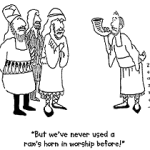Last week I shared some thoughts on an important criteria we should apply when choosing and selecting music for worship services: that the music should be Christ-centered.
This point, and the next few criteria, are all drawn from Colossians 3:16, a verse that specifically calls followers of Jesus to “let the word of Christ dwell in you richly, teaching and admonishing one another in all wisdom…”.
In this post, let’s look at another important consideration when choosing worship music:
2. “… dwell in us richly …”
The worship songs we sing in service should help, rather than hinder, the word of Christ to dwell in us richly.
The word richly here is translated from the Greek word plousiÅs, and is used in a number of other places to describe either material wealth (1 Tim 6:17), or spiritual abundance (2 Peter 1:11, Titus 3:6). In each of these contexts, it’s an adjective to explain that something has been given over and above what we’d expect.
If you have ever had a line of a song stuck in your mind for days, or find yourself humming a tune days on end, you could say those words are dwelling in you richly! I believe this is one reason why God gave music such powerful properties.
There have been many times where a well-crafted song lodged itself in my mind. Here’s the most recent one: on Sunday the music team (led by Craig Starrenburg) presented a beautiful a cappella version of “Grace Greater Than Our Sin”, by Julia H Johnston and Daniel Towner. After hearing it, neither Cheryl nor myself could stop humming the chorus for the rest of the day:
“Grace, grace, God’s grace, grace that will pardon and cleanse within,
Grace, grace, God’s grace, grace that is greater than all our sin!”
In this example, by using a well-crafted, memorable melody, the truth of the doctrine of grace has a better opportunity to dwell in the listener.
And I’m sure in a similar way, many of you will be able to recall a line or two from worship songs such as: “Amazing Grace”, “How Great Thou Art”, “Shout to the Lord”, and so on. And I know when introducing a new song to the church, a big factor in how well the congregation will take to it comes down to how easy the tune is to pick up, and to recall.
However, melody isn’t the only consideration that worship/song leaders need to take into account. Vocal instructor Karyn O’Connor explains an important point that many music teams and worship leaders (myself included!) can forget:
“The average person in the congregation both expects and needs the worship songs to be singable – from melody to key signature to tempo to arrangement – so that he or she can participate fully and without distraction.”
Elements of effective music: some questions to ask
For those more experienced with musical terminology, here are some specific questions you could ask when considering the how effective a song, and some of its musical components, might be in helping plant God’s truth deep in us:
- How easy will it be to follow, remember, and recall the melody?
- Does the harmony help direct the church to sing the correct tune, and start/stop at the correct places?
- How easy will it be for the church to pick up the correct rhythm of the tune? Will any rhythmic devices (such as ornaments, syncopation) add to, or detract from the ability to sing and dwell on the words?
- Will the church be able to adequately follow the structure of the song? Are song elements (chorus, refrain, verse, bridge, instrumentals, solos) marked out clearly, and easy to follow, or will it confuse and distract from the song?
Granted, the way these questions are answered will vary, depending on the musical experience of your church. For example, if most of your congregation are familiar with the nuances of contemporary music, then songs like “Blessed Be Your Name” by Matt Redman (with its heavily syncopated verse and Verse/Chorus/Bridge structure), and “Revelation Song” by Jenni Lee Riddle (with its more complex, meandering melodic/harmonic combo in the verse and chorus) will work just fine.
But take the same song and teach it to a congregation completely unfamiliar with rhythms that don’t stay on beat, melodies that are varied or embellished each time they’re repeated, or song components such as bridges and repeated choruses, and it will likely be more difficult for these saints to remember and recall these songs.
As worship leaders and musicians, therefore, we should practice discernment in ensuring that our selection of worship songs are an aid, and not a hindrance, in helping the word of Christ dwell in us richly.
———————-
When recalling his own testimony of salvation in a letter (1 Timothy 1:12-17), you can almost picture the Apostle Paul bursting into song:
“To the King of ages, immortal, invisible, the only God, be honor and glory forever and ever. Amen!”
In the same vein, wisely selecting and presenting songs with music appropriate for the congregation can help build up the church, help the word of Christ dwells in them richly, and stir our hearts to praise the Lord as Paul does!
So here’s a question for you: what songs have you sung in church, or heard on the radio, or on a CD, that have helped the word of Christ dwell in you richly?
————————-
-William Chong





Comments are closed.